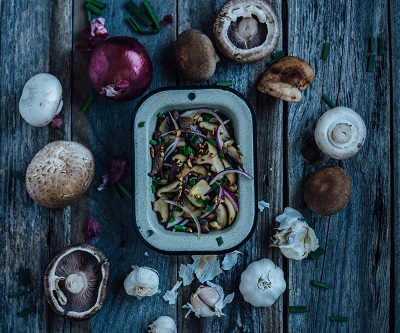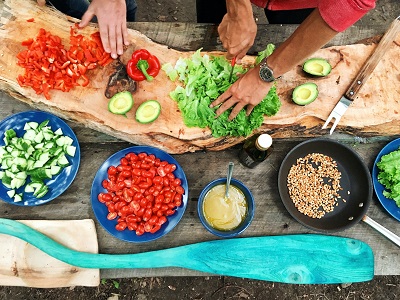‘O’ is for onions and ‘M’s is for mushrooms in the acronym G-BOMBS. Using onions and mushrooms in preparing our foods not only adds great flavors but are also healthy ways to support our immune system.
G-BOMBS defined: G = Greens, B = Beans, O = Onions, M = Mushrooms, B = Berries, and S = Seeds.
OTHER WAYS TO SUBSCRIBE AND LISTEN:








We invite you to listen and share your perspectives with us too. Send us a recorded message through Speakpipe. We may use your message in an upcoming episode, therefore, please leave your name if you would like it to be noted during the podcast. Leave an email address if you would like a personal response or feel free to use the contact form.
If you haven’t done so already, download the Delicious “No-Fail” Salads Guide – another great way to eat those GREENS!
Show References & Additional Notes:
Mushroom Soup (Video Recipe)
“Thank you” to Dawn. Dawn is my live-streaming friend I mention in this episode who introduced me to the concept of G-BOMBS.
Shonda (00:00): Start from the heart. I mean, you know, I mean, really why are we doing this? Because, you know, we, we have, uh, discovered something that we think is great, right?
Shonda (00:21): Hi and hello. Welcome to the real food and drinks lifestyle podcast. We're building a community to talk about nutrition, lifestyle choices, and just feeling better. This is Shonda and this is Patryce. Let's just be real. [inaudible] Here's our disclaimer. We do not officially practice in any of the various subjects that we discuss. We are only sharing our personal experiences with you to a healthier lifestyle. Please do your own research before taking part in any of these practices.
Shonda (01:08): I think I was on, um, one of my live streaming with some friends and just chatting through the chat and trying to get some ideas for what to talk about or what to do videos about. And one just mentioned G-BOMBS. You know, she said G-BOMBS and I had to go look it up because, you know, even though I've been eating G-BOMBS forever and for really a really good three years since I've adopted the whole food plant-based diet, I mean, that's all that it is, you know, and mushrooms make things taste good, you know? So that was always thrown in there and onions and things like that. And you know, I know greens, give me energy. What else is there? And the beans, I just love beans. I just love the taste. So, you know, everything I've been eating is the G-BOMBS.
Shonda (01:55): So I'm like, okay, well I'll present it this way. That's why we're bringing all of this to you. And we just want to share on ways that we have discovered on how to eat in a healthy way, or is it helpful way? I don't know what, but.
Patryce (02:11): I would say both, healthy and helpful. I had never heard of G-BOMBS until you mentioned that not too long ago, but that my husband had actually heard about them. And I think it's just a great way to remind people of ways we can incorporate healthy food daily by just remembering what G-BOMBS stands for and we've already covered greens and beans. And today I think we are covering mushrooms and onions. Right? [Right.] Yeah. Mushrooms I've always liked them like yourself and continue to like mushrooms. There are so many out there, but it wasn't until we started thinking about G bombs and what to talk about that I researched the mushrooms more and learned that they are very
Patryce (03:00): Very ealthy. And what, I mean, by that is that they have been associated with decreased risk of breast cancer , stomach and cancer of the colon. Wow. And there was even a Chinese study that I think Dr. Oz mentioned Joan Lunden as well as Dr. Furhman. I think all three of them cited them somewhere. They talked about this same Chinese study, a women who ate at least 10 grams of fresh mushrooms each day. That's about one mushroom per day, had a 64% decrease risk of breast cancer.
Shonda (03:42): Wow. That's a powerful little thing. Isn't it? If it's just one mushroom.
Patryce (03:48): Exactly. And I'm just like, wow, how did I not know about this?
Shonda (03:55): Yeah. And actually though I just read today though, that I think Dr. Furhman who came up with the G-BOMBS, uh, acronym, I think he recommends that they are always cooked for some reason. But, you know, I really don't. I used to study the nutrition part, you know, about all these foods. And so I'm glad you like to do that part and that you bring that for us because now I'm just like, just eat, just eat everything and just eat as much as you can and you will get the nutrition that you need, you know, so, But, um, so, you know, and, and, and when we're talking about plant-based food, I mean, it's always good to eat a mixture of raw and cooked vegetables. You know, sometimes eat them cooked the same vegetables, sometimes eat them raw. So I think that by doing that, we get the full benefit of, um, the vegetable itself. So.
Patryce (04:55): That's a really good point because when I read fresh, I didn't know, they meant fresh and steams. Fresh and sauteed? Did they mean raw. [Right. Yeah.] It wasn't a hundred percent clear. Um, and, and just from personal experience, I will eat raw mushrooms, but most, most of the time I have sauteed them, I've cooked them to some degree. Um, maybe not even a lot, but I seldom eat the raw mushrooms. I think it's fine. Like you said, to have some raw, but, um, definitely with mushrooms, I found them more palatable by stir-frying them or doing different roasting or what have you, or grilling them all different ways of eating them. Um, so I was just, again, blown away by that information about breast cancer. I really like some people out there, you know, some of us like mushrooms, but we don't go out of our way to eat them. And that that's been something that I'm going to start going out of my way to incorporate mushrooms on a more regular basis.
Shonda (06:01): Yeah. I usually I buy them every week and sometimes though it's like the end of the week and I'm like, Oh my goodness, I have these mushrooms in here. So I'm trying to cut around, you know, I'm left with them. So what I'm going to do now is just make sure that, you know, when Friday's my grocery day, when I buy those mushrooms, that's the day that I'm going to probably cook the mushrooms. And actually now we just got a food saver so I can actually seal them back up. And that was really nice for this week. This is the first week I, I resealed the mushrooms. So that's, um, um, money saving tips there, you know? Um, so yeah. Now what do you think is going to be your favorite? You know, what do you think you're going to do with mushrooms now? I know you just told me a little bit, but are there any new recipes you have in mind?
Patryce (06:53): Well, actually, I, I, I've been eating a mushroom. Maybe you can call it a casserole, uh, similar to one, but basically it's just like mushrooms. And again, there's so many, they're the portabella, they're the oyster ones. They're the, there are several types of mushrooms and maybe we can have those in show notes later, list some of those out for you, but, um, just slicing some mushrooms and adding some tofu. And then a nice little sauce, uh, more of an Asian inspired sauce. You can make one yourself, um, instead of soy-based I use that coconut amino acid, um, and some ginger, but anyway, uh, an Asian inspired sauce over the slice mushrooms with, uh, some tofu and then maybe some brown rice.
Shonda (07:49): Okay. That sounds good. Kind of like a stir fry.
Patryce (07:52): And add some greens on top of that. Some spinach or kale, and I'll have a meal right there. I've been doing that. And then adding some chick, well hummus on the side. That's been tasty. But there's so many other things actually, uh, I didn't make it, but my stuffing, I looked at a recipe. You can make a stepping with mushrooms. Also, you can make, uh, instead of your traditional stew, (instead of) a beef stew, I saw a recipe using mushrooms and it looked similar to a beef stew and I haven't made that one yet, but that's another thing I'm encouraged, I mean, I'm looking forward to making a stew with mushroom and then also there's, you can just, I often just, uh, put some vinaigrette, some salt pepper, or that Bragg's seasoning I like to use and throw them in the oven and roast them, have them at the side.
Shonda (08:47): Oh yeah. I roasted some today with some potatoes and just everything. I did that sheet pan roasting. I did that today. Um, but you know, I think about when I may have initially started on my, um, plant-based diet, I would substitute the larger portobellos for like burgers, you know, grill them cause they're so big and thick, so that's a good, nice way. You know what I think I'm going to have that this weekend. What we're going to talk about also are the onions and I've made like a, uh, uh, gravy using mushroom and onions. And I have this specific recipe that I want to share. I'll put in the share notes, uh, and it's going to be a link to a video. And, uh, I made it about a month ago and my daughter really liked it that she asked for the recipe and she and her friend were going to try and make it, I don't think they were successful because something happened. I cannot remember what happened, but, uh, anyway, she was really, they, she really liked it. So I'll definitely put that one there. Um..hmm.
Patryce (09:56): And then I'm wondering, especially for onions, are they better to eat cooked some or raw or, or is it, you know...
Shonda (10:08): I think just like with any other vegetable, we should just do both because I've heard some people complain with their raw....I guess some people who have acid reflux.
Shonda (10:20): Yeah. Yeah. So yeah, cook them if they don't do well raw, but some lighter ones that you could eat that are raw would be like green onions, the tips of green onions.
Patryce (10:32): Oh, I forgot about those. Yeah, the green onions, very tasty and very good raw,.
Shonda (10:38): You know, sometimes I use green onions in place of a regular onion when I make, um, guacamole. Yeah. [That's a good idea.] Yeah. That gives it another taste. So onions include, you know, it's not just onions a round bulb of onions, but, uh, also leeks is in that same group. Um, garlic, chives, shallots, and scallions. Um, they're all in the same family, this family, you know, the onion group has, um, beneficial effects on the cardiovascular and immune system. And of course, as well as anti-diabetic and anti-cancer effects. So I think that it just helps with ...these help mostly with like detoxifying, you know, and also I think they, I know garlics are, are great, uh, prebiotic, which feeds the good bacteria in your gut. So, you know, it promotes a good colon health, you know, good stomach and digestive system health.
Patryce (11:51): Oh, that's important.
Shonda (11:54): Yeah. Let's not forget about the onions. And I do think that, you know, when, you know, when you really slow roast onions or slowly cook them, they do become sweeter. You know, there may be someone out there that's not aware that they how sweet they become. I love cooked onions.
Patryce (12:14): I forget to do it sometimes. But, um, I definitely like them somewhat uh, what do you..you said...caramelized. Very good on sandwiches. They're just good.
Shonda (12:28): I mean, we throw, uh, we throw onions in everything, right. I mean, you know, salads, or even when we make, like, I make like the chickpea salad, you know, it's just a really good flavor enhancer. I love both, um, you know, onions and garlic. I don't use the shallots or the scallions as much. Sometimes if there's a specific recipe, I may use it, but um, not really. Oh, and you know what, let's see here. One thing also, I know many people have heard of this, um, uh, onions are high, have high concentrations of quercetin. Are you familiar with quercetin?
Patryce (13:12): Is that for pain? or...
Shonda (13:12): Sometimes, you know, a lot of people go for quercetin when they have allergies.
Patryce (13:19): Oh, the shots?
Shonda (13:20): No, they're little..they're... You can buy quercetin, a quercetin supplement and it's good for anti-inflammatory, um, you know, as good as an anti-inflammatory. And I know a lot of people that use it, I think I used to use it when I had seasonal allergies. I would go for the quercetin.
Patryce (13:41): Um, I didn't know about that.
Shonda (13:45): Yeah. So seasonal allergies?... Go eat some onions.
Patryce (13:53): Well, speaking of onions...it's a little off topic, but it's still pertaining to onions, I know I have actually sliced onions and put them on the soles of our feet. And I know... When did we start? Anyway, you mentioned earlier about being a detoxifier. And I think when you have a cold or...It seemed to really help the kids and I experimented myself, but it sounds odd, but you just put a couple rounds on the bottom of your feet with a sock. Similar to how people do that, uh, vapor...what do you call that?
Shonda (14:34): The Vicks vapor rub.
Patryce (14:37): That the onions, it seems like it really calms those colds and helps you get over it faster.
Shonda (14:45): Uh hmm, well, let me tell you that I used to make, I'm trying to think of what..., When Erin would get sick, even as a child, you know, young, you know, prior to teens, uh, and even now she will take it, but I would make..., I would do similar. It must be similar to, I'm going to put a pickled onion recipe link there, but I used to do, um, was it just onions or did I do onions and garlic? I would put onions in a, in a shallow dish and cover with honey and kind of mush it and just sit it out on the, on the countertop. Yes. And just kind of mush it and let all the juices get into the honey and feed it to her as a syrup when she had a cold or respiratory...
Patryce (15:33): That was really helpful. And then the syrup is good for your throat.
Shonda (15:40): So there we go. Anti-inflammatory right?
New Speaker (15:42): Yeah. Oh my goodness. Okay. See, we can do that instead of the cough syrup...[laughs]
Shonda (15:48): Yeah, instead of cough syrup. Actually, I have some in my fridge and, um, it's been there probably about a year. I can't remember if she had something or whatever it was right before COVID so, or may have been right before we realized COVID was there and we had something. Cause you know, um, we do think that we may have had COVID already. Not sure. Have not been checked yet. If we get checked, are you, would you ever get, are you going to get checked for, for the antibodies?
Patryce (16:22): I would like to, but some people say that after six months you don't have the antibodies anymore. I don't know.
Shonda (16:28): Yeah. That's possible. So well, it's been over six months, but anyway, we did. And, and sometimes, you know, just like I go in and have sauerkraut, the sauerkraut or kimchi have onions in them too. I've put, uh, onions in kimchi. Of course that makes it spicy. Onions and garlic. And so yeah, sometimes I just, you know, kind of try and listen to my body and say, Ooh, I may feel a little something in my throat or something like that. And then I'll just go and have a teaspoon or tablespoon of kimchi with onions, you know, or, you know, I may just pass by that syrup and have a little bit, even though that syrup is just preserved, it's just, it's just like doing, um, a fermented food and it's just in the fridge. So it's going to last forever and it's in honey. So, you know, honey is a preservative anyway, it preserves things. So, uh, it's in the fridge, I guess, ready to go.
Patryce (17:29): No, I did not. I used to give the kids a little bit of honey during that... When you get a cold, because our doctor finally said, you know, in England, they don't even prescribe cough syrup immediately. They prescribe a bit of honey. But now that you're mentioning this whole idea with the onion, that's the way to go in the future. I think you need something like that. I will definitely do that. And you, mentionedthat garlic is in the same family. I know my aunt, uh, she's now in her 60's or 70's, but way back when ... she used to roast garlic almost every other night and she would just eat cloves of roasted garlic. And she just...she seldom got sick. I wonder now if that was helpful for her all those years, back in the eighties and seventies even.
Shonda (18:21): Yeah. I've read, you know, that garlic is a natural antibiotic. So, um, yeah, I do. I like a fresh salad, especially a Tex-Mex salad. I can just take a clove and just mince it on my salad and mix it in and eat it. I like it like that too.
Patryce (18:39): Well that, you know, I've gotten used to this whole fermented black garlic and that's my garlic. It's softer and it's sweeter. Um, I hope it's just as good for you. I know it's not bad for you. But, and now I'm getting hungry.
Shonda (18:55): Yeah. I know. It's like we can almost smell it, right?
Patryce (18:58): Yeah. Yeah.
Shonda (19:02): So yeah, we just want to, um, continue to encourage everyone to add more onions and mushrooms to your diet.
Patryce (19:11): And wow! They are, they have anti-cancer properties and who doesn't want some of that in their diet?
Shonda (19:19): Yeah. These are kind of like maybe like the power, power foods of the plant-based diet, although they they're all anti-cancer because you know, they all have different properties. I just always go back to eat a variety, just continue to eat a variety, whatever you're eating, maybe you, whatever you prepare, maybe you don't readily go for the mushrooms or onions, you know, at this point, but try adding some of that to your dishes that you're making. And I'm sure many people using garlic and onions, cause that's just kind of a given isn't it? This kind of like a basis first.
Patryce (19:58): It is. But that's why I'm so excited that we did talk about mushrooms too. And that they're part of G-BOMBS because people, like I said, I love mushrooms, but it's not something I generally go out of my way. You know, when you're out and you're ordering, you're like, Oh, mushrooms can be added? You add it. But now maybe more people like myself included will be intentional about adding mushrooms. So everyone spread the word about mushrooms and onions. And just remember G-BOMBS they're worth incorporating all of these into our everyday diet.
Shonda (20:32): Yes. Every day,!
Shonda (20:33): Hey, we hope you've been enjoying the G-BOMBS series. Next week we will have our final episode regarding G-BOMBS in which we will be discussing berries and seeds.
Shonda (20:50): Thanks for listening. We hope you enjoy today's podcast. Remember you can catch show notes and additional details@realfoodanddrinks.com under the podcast menu. Also subscribe to our podcast. If you aren't already a member of our community. And if listening through anchor, please send us a message of topics you would like to hear us have conversations about until next time. Let's just be real.
GET STARTED WITH THE REAL FOOD AND DRINKS LIFESTYLE
Enter your name and email address below and I'll notify you weekly of podcasts, website posts, recipes, videos, and events that have been shared during the week because you won't want to miss these.



